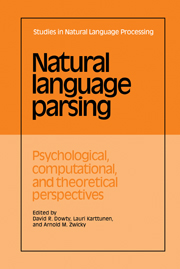Book contents
- Frontmatter
- Contents
- Contributors
- Acknowledgments
- Introduction
- 1 Measuring syntactic complexity relative to discourse context
- 2 Interpreting questions
- 3 How can grammars help parsers?
- 4 Syntactic complexity
- 5 Processing of sentences with intrasentential code switching
- 6 Tree adjoining grammars: How much context-sensitivity is required to provide reasonable structural descriptions?
- 7 Parsing in functional unification grammar
- 8 Parsing in a free word order language
- 9 A new characterization of attachment preferences
- 10 On not being led up the garden path: the use of context by the psychological syntax processor
- 11 Do listeners compute linguistic representations?
- Index
3 - How can grammars help parsers?
Published online by Cambridge University Press: 25 January 2010
- Frontmatter
- Contents
- Contributors
- Acknowledgments
- Introduction
- 1 Measuring syntactic complexity relative to discourse context
- 2 Interpreting questions
- 3 How can grammars help parsers?
- 4 Syntactic complexity
- 5 Processing of sentences with intrasentential code switching
- 6 Tree adjoining grammars: How much context-sensitivity is required to provide reasonable structural descriptions?
- 7 Parsing in functional unification grammar
- 8 Parsing in a free word order language
- 9 A new characterization of attachment preferences
- 10 On not being led up the garden path: the use of context by the psychological syntax processor
- 11 Do listeners compute linguistic representations?
- Index
Summary
There has been some interest in recent years in finding functional explanations for various properties of human languages. The general form of these explanations is
Languages have property P because if they did not
couldn't learn them; or
couldn't plan and produce sentences efficiently; or
couldn't understand sentences reliably and efficiently; or
wouldn't be able to express the sorts of messages we typically want to express.
Some linguists are dubious about the legitimacy of such investigations, and they are indeed a notoriously risky undertaking. It is all too easy to be seduced by what looks like a plausible explanation for some linguistic phenomenon, but there is really no way of proving that it is the correct explanation, or even that functional considerations are relevant at all. What, then, can be said in favor of this line of research?
Setting aside the sheer fascination of finding answers to why-questions, we can point to some more practical benefits that may result. First, we may find out something about the learning mechanism, or the sentence processing mechanism, or whichever component of the language faculty provides a likely functional explanation for the linguistic facts. In this paper we will concentrate on the sentence parsing mechanism. (See Fodor and Crain, in preparation, for discussion of language learning.) It is clear that one can derive at least some interesting hypotheses about how the parser is structured, by considering how it would have to be structured in order to explain why certain sentences are ungrammatical, why there are constraints excluding certain kinds of ambiguity, and so forth.
- Type
- Chapter
- Information
- Natural Language ParsingPsychological, Computational, and Theoretical Perspectives, pp. 94 - 128Publisher: Cambridge University PressPrint publication year: 1985
- 155
- Cited by

